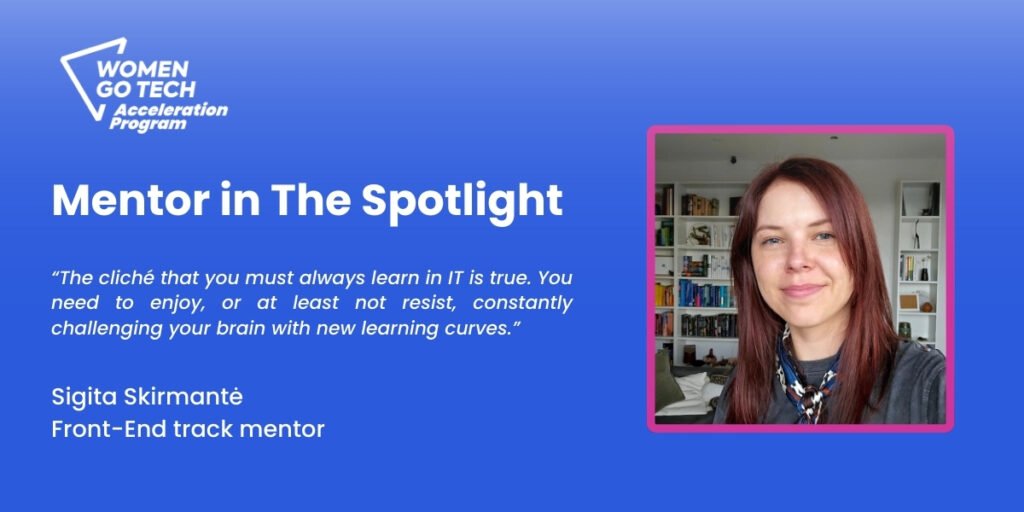|
Getting your Trinity Audio player ready…
|
Today, we’re excited to introduce Sigita Skirmantė, a passionate front-end engineer at Devbridge and a dedicated mentor. With her own recent journey into IT, Sigita deeply understands the challenges and triumphs of starting from scratch in this fast-paced field.
Having been mentored herself, she’s committed to giving back to the community by guiding and supporting aspiring developers. In this interview, Sigita shares her insights on mentoring, advice for those starting out, and the essential qualities for front-end engineers.

What drove you to become a mentor?
Having quite recently made the leap into IT myself (almost 4 years ago), I get the struggles of starting from scratch in a new field. I’ve been there, in the trenches of an entry-level position, trying to figure it all out. I know what it’s like to feel lost in a new field, trying to figure things out on your own.
But I also know the power of having someone in your corner, someone who can offer guidance and support.
I was fortunate to have a mentor who not only helped me identify areas for improvement but also believed in my abilities more than I did, convincing me I could land my first IT job. It’s definitely motivating when those close to you are supportive every day.
However, it’s even more impactful when a professional in the field you aspire to enter believes in you and assures you that you can succeed. His/her support significantly boosts self-esteem. I am grateful to my mentor Žygis up to this day. So, having been lucky myself, I want to give back to the community.
What advice would you give to those who are new to mentoring or are thinking of joining?
Seeing the struggles and triumphs of mentees, witnessing their journeys unfold, it’s incredibly rewarding. Being able to offer guidance and support to someone starting out in this field is incredibly fulfilling. So my advice would be – just start! If you’re already working in the field, you will definitely have some advice to share and technical gaps to help with.
Imposter syndrome is real for nearly every IT professional at some point in their career, including mentoring. In my experience, having those first meetings with your mentees can really help ease these feelings. Once you interact with them personally and get to know the people behind the profiles, you’ll feel a warm sense of connection and inspiration.
I believe that throughout it all, it is important to emphasize that it’s okay to struggle and ask for help. We’re all in this together, and the journey is just as important as the destination.
What do you hope to achieve in the Acceleration Program?
To be the mentor I had when I was starting out – someone who gets it, keeps it simple, and genuinely wants to see mentees succeed in this crazy world of tech. Hopefully, mentees will feel technically and emotionally more mature when entering the IT sector.
What is your one piece of advice for the mentees trying to land their first job?
The harsh truth is that many people today complete various programming courses, but a certificate alone doesn’t assure employers that aspiring developers have truly learned the material, are genuinely motivated, or that the course was of high quality.
My advice is to take extra steps to stand out. Demonstrate your dedication through GitHub activity beyond just course homework, attend IT events, enhance your LinkedIn profile with meaningful descriptions, host a webpage (even a simple one), and engage in any other activities that showcase your determination beyond the standard courses taken by others in the industry.
What characteristics do you believe are important for front-end engineers?
This is especially true for front-end developers, where attention to detail and a passion for UX and UI are crucial. Additionally, it’s important to honestly assess your willingness to learn continuously. The cliché that you must always learn in IT is true. You need to enjoy, or at least not resist, constantly challenging your brain with new learning curves.
You will likely never reach a point where you can say, “I feel completely confident and can stop researching.” Learning is a daily part of the job, from junior to senior levels.
Find more mentor stories here.
